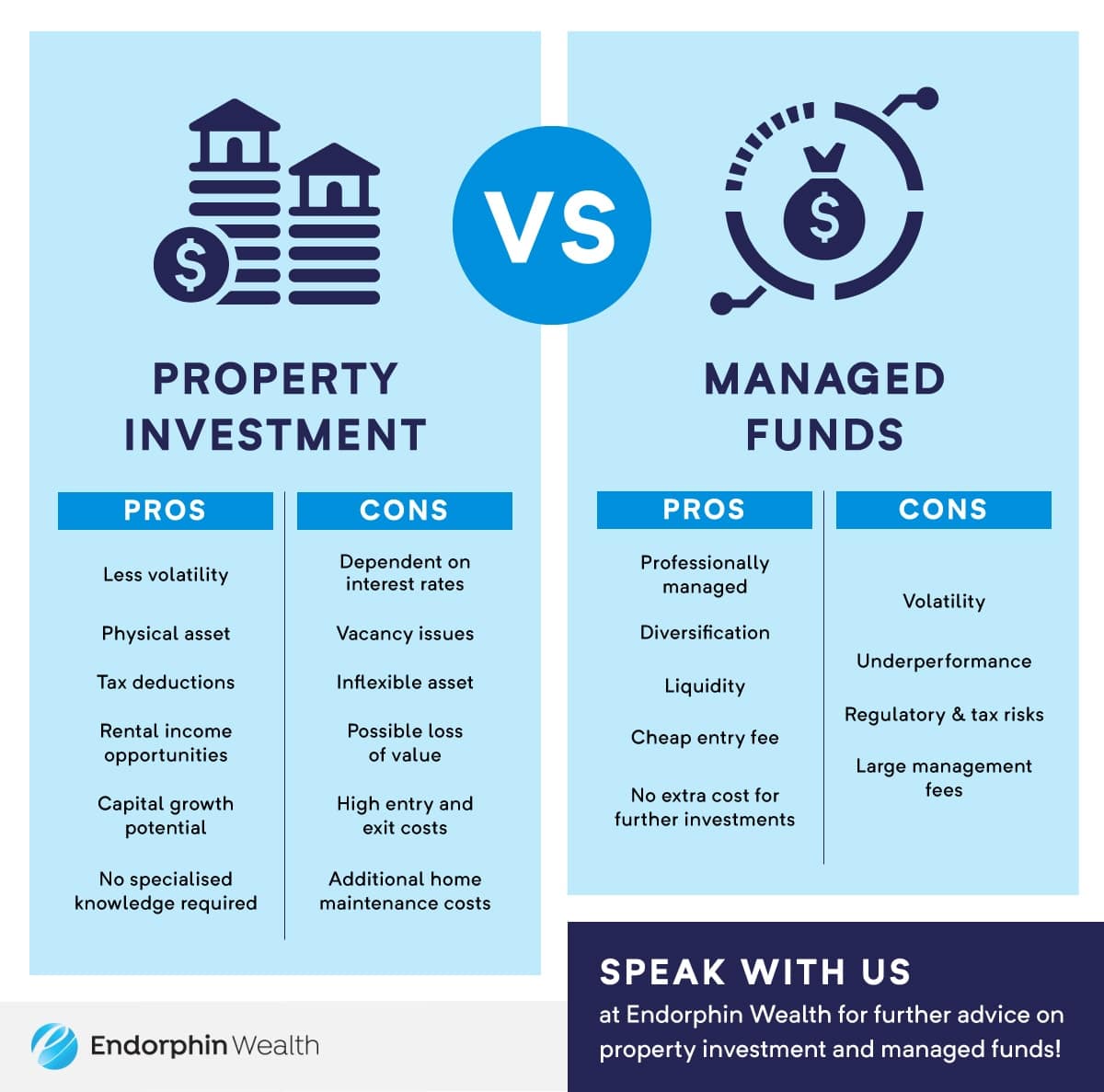Retirement planning is serious business. You need a solid strategy to be able to see out your golden years in comfort and dignity. When it comes to investing in your retirement, there are generally two strategies that are most recommended: Investment Properties or Managed Funds. Both have their pros. Both have their cons!
The team at Endorphin Wealth have been advising their clients for many years on which investment strategy is best for their situation. We can assist you to:
- Consider what investment strategy is right for your situation
- Provide advice and ongoing management for the investments and review cash flows and cost
- Assisting with changing your investment strategy if the need arises.
What is a Property Investment:
The attractive Australian house market has many people investing in property. Property investments are often seen as being less risky than other forms of investment. They are usually a stable investment, but you are also able to leverage your investment. This means instead of taking $100,000 to put into the stock market, you may be able to purchase a $500,000 home. However, while it may seem more straightforward, there are pitfalls to be aware of. Here’s what you need to consider about investing in property.
Pros of Property Investments:
- Less volatility – Property can be less volatile than shares or other investments.
- Income – You earn rental income if the property is tenanted.
- Capital growth – If your property increases in value, you will benefit from a capital gain when you sell.
- Tax deductions – You can offset most property expenses against rental income, including interest on any loan used to buy the property.
- Physical asset – You are investing in something you can see and touch.
- No specialised knowledge required – Unlike some complex investments, you don’t need any particular specialised knowledge to invest in property.
That sounds rather attractive. However, owning a property is filled with surprise costs. It all adds up — $1,500 here, $2,496 there and then $2,000 on council rates. The bottom line is property is expensive to own, not just buy. This is not to say you cannot make a profit, however, being aware of the real return after costs are taken into account will put you at an advantage when it comes to deciding how to best invest your money.
Cons of Property Investments:
- Cost – Rental income may not cover your mortgage payments and other expenses.
- Interest rates – A rise in interest rates will mean higher repayments and lower disposable income.
- Vacancy – There may be times when you have to cover the costs yourself if you don’t have a tenant.
- Inflexible – You can’t sell off a bedroom if you need to access some cash in a hurry.
- Loss of value – If the property value goes down you could end up owing more than the property is worth.
- High entry and exit costs – Expenses such as stamp duty, legal fees and real estate agent’s fees.
- Additional home maintenance cost– Cleaning, repairs, termite protection etc.
As you can see, the costs of owning an investment property can be substantial. So, what about managed funds, are they any better?
What is a Managed Fund:
A managed fund involves pooling together money from different investors into one fund that is invested and controlled by a professional investment manager. Funds could be Australian or international shares, bonds, property or cash. You can invest in a single asset class such as shares or fixed interest, or a multi-sector option such as a Growth or Balanced fund, which contain a mix of different asset classes. This is your risk diversification and it should match your objectives from the outset.
When you invest in a managed fund, you hold units in the fund. For example, an investment of $5,000 at a unit price of $1 gets you 5,000 units. The unit price, or value of each unit, reflects the market value of the assets held within the fund at any given time. As such, your units can change in price daily in accordance with the rise and fall of the assets’ market values. You may also earn income in the form of dividends or interest when the fund makes profits from its assets.
Pros of a Managed Fund:
- Professional Management – You are using professional investment managers who have access to information, research and investment processes.
- Diversification – You are able to diversify more than would be feasible for you investing directly and this theoretically reduces risk.
- Liquidity – Assets are publicly listed so they can be sold quickly
- Cheap Entry Fee – You share costs with a pool of other investors which should reduce your cost of investing.
- No extra cost for further investments – You can make relatively small investments into asset classes that have large minimum investments because you are sharing the investment with others.
However, the main issue that people worry about when investing in managed funds and shares is volatility. Or, basically, will the markets fall? Volatility can be caused by a number of factors but it’s not all bad. For one, you make an informed choice on how much risk you are willing to take when investing in managed funds. Each managed fund has different risk profiles, but it is important to understand the cons that come along with a managed funds account.
Cons of a Managed Fund:
- Underperformance – Managed fund investments may underperform or decline in value. This will affect your return.
- Regulatory and Tax Risk – Government or a regulator may introduce regulatory or tax changes which can affect the value of securities
- Fees – Some funds charge large fees to manage the portfolio and access markets or stocks which would be difficult to access for an individual
For reasons like these, seeking good financial advice is important and provides great insights into constructing an initial portfolio of managed funds. Endorphin Wealth has always strived to ensure customers get their bang for their buck. We will also help you adjust your investments over time ensuring you remain in high-quality positions over the long term.

Verdict: Property Investment or Managed Funds
When comparing the two options for long-term retirement strategy, managed funds make the stronger case. When comparing the cost involved with owning an investment property and setting up a managed funds account, the cons outweigh the pros for investment properties.
The simple truth is when you compare the costs of investment properties vs. managed funds, your money and your future are in much safer hands with a qualified financial planner in Melbourne. And, as they say, the best two times to invest for the future are 15 years ago and right now!
Looking to start investing in a managed fund or thinking of purchasing an investment property? Contact Endorphin Wealth today for advice via phone at (03) 9190 8964 or at [email protected] .










